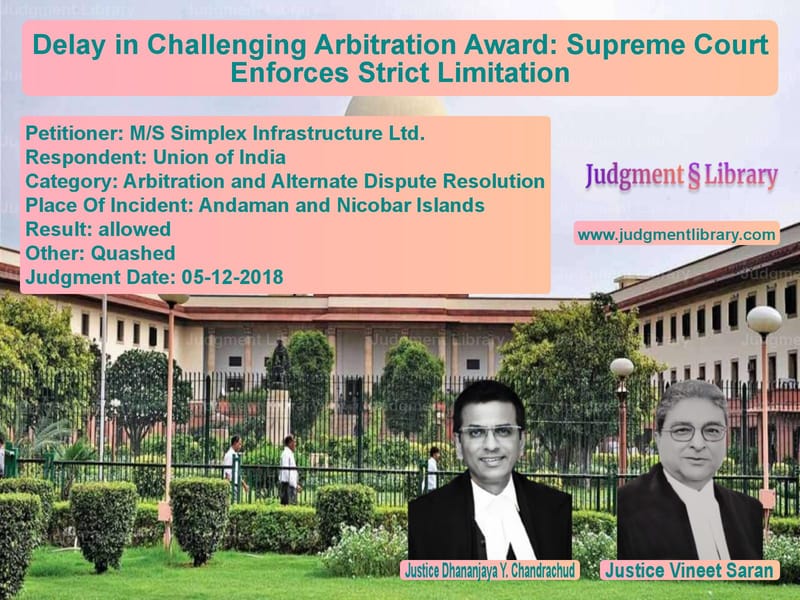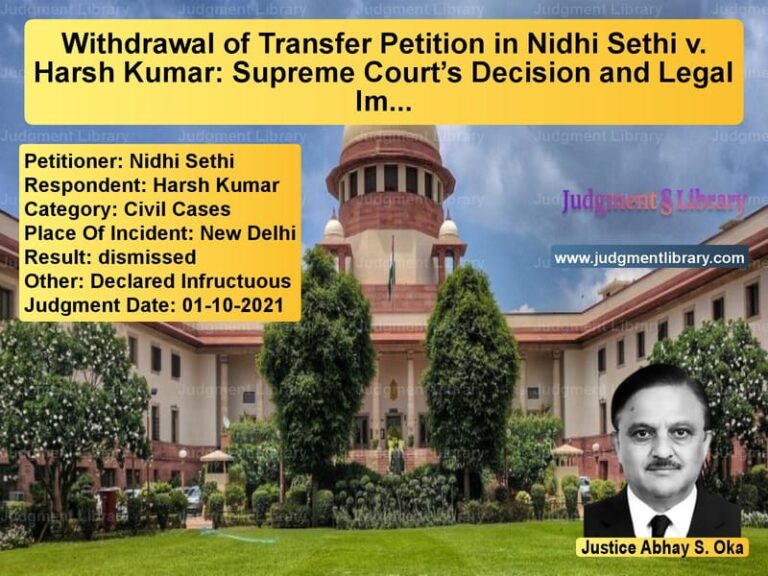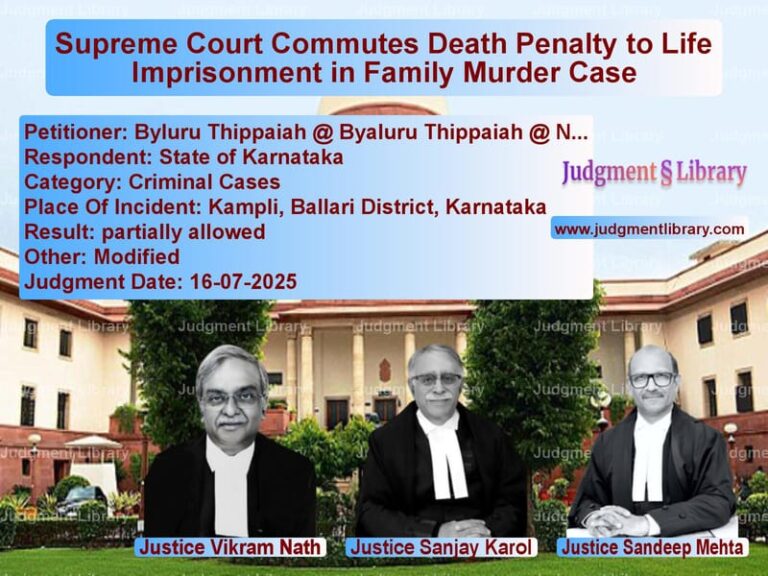Delay in Challenging Arbitration Award: Supreme Court Enforces Strict Limitation
The case of M/S Simplex Infrastructure Ltd. vs. Union of India addresses a critical issue concerning the time limit for challenging an arbitral award under the Arbitration and Conciliation Act, 1996. The Supreme Court had to determine whether the High Court was justified in condoning a delay of 514 days in filing an application under Section 34 of the Act.
The dispute arose from a construction contract between Simplex Infrastructure Ltd. and the Union of India. After arbitration, an award was passed in favor of Simplex Infrastructure Ltd. The Union of India sought to challenge the award but initially filed its petition in the wrong forum, leading to a significant delay. The Supreme Court’s ruling reinforced the strict timelines for filing applications to set aside arbitration awards.
Background of the Case
The dispute originated when the appellant, Simplex Infrastructure Ltd., entered into a contract with the Union of India for constructing permanent shelters in the tsunami-hit Andaman and Nicobar Islands. The timeline of key events is as follows:
- On January 5, 2006, Simplex Infrastructure Ltd. was awarded the contract for constructing shelters.
- Due to disagreements over project execution, the matter was referred to arbitration.
- On October 27, 2014, the arbitrator ruled in favor of Simplex Infrastructure Ltd., awarding Rs. 9.96 crore with 10% simple interest per annum from January 1, 2009.
- The Union of India received the arbitration award on October 31, 2014.
- On January 30, 2015, the Union of India challenged the award under Section 34 of the Arbitration Act before the District Judge, Port Blair.
- On February 12, 2016, the District Judge dismissed the application for lack of jurisdiction.
- On March 28, 2016, the Union of India filed a fresh application under Section 34 before the Calcutta High Court along with an application for condonation of a 514-day delay.
- On April 27, 2016, the Calcutta High Court allowed the delay, permitting the challenge to the arbitral award.
- Simplex Infrastructure Ltd. challenged the High Court’s decision in the Supreme Court.
Legal Issues Considered
The Supreme Court examined the following legal questions:
- Does the Arbitration and Conciliation Act impose a strict time limit on challenging arbitral awards?
- Can Section 5 or Section 14 of the Limitation Act be applied to extend the time limit under Section 34(3) of the Arbitration Act?
- Did the High Court err in condoning a delay of 514 days in filing the challenge to the arbitration award?
Arguments by the Appellant (Simplex Infrastructure Ltd.)
The appellant contended that the High Court’s decision was legally unsustainable. Their key arguments were:
- “Section 34(3) of the Arbitration Act provides a strict limitation period of three months, extendable by only 30 days for sufficient cause.”
- “The delay of 514 days is far beyond the permitted extension and should not have been condoned.”
- “Even if Section 14 of the Limitation Act is applied to exclude the time spent in the wrong forum, there was still a delay of 131 days, which is not condonable.”
- “The Supreme Court has consistently held that Section 5 of the Limitation Act does not apply to Section 34 of the Arbitration Act.”
Arguments by the Respondent (Union of India)
The Union of India defended the delay on the following grounds:
- “The delay occurred due to a bona fide mistake in filing the challenge before the wrong forum.”
- “The government had administrative difficulties in obtaining necessary permissions for filing the case.”
- “The High Court rightly exercised its discretion in condoning the delay to allow a fair hearing on the merits.”
Supreme Court’s Observations and Judgment
The Supreme Court, comprising Dr. Dhananjaya Y. Chandrachud and Vineet Saran, overturned the High Court’s ruling and dismissed the challenge to the arbitration award. The Court emphasized:
“Section 34(3) of the Arbitration and Conciliation Act provides a strict time limit of three months, extendable by only 30 days. Beyond this, the court has no jurisdiction to entertain an application.”
The Court provided the following rationale:
- The use of the words “but not thereafter” in Section 34(3) clearly indicates that the time limit is absolute and unextendable.
- The period of limitation prescribed under Section 34(3) of the Arbitration Act is different from other civil proceedings and is meant to ensure finality in arbitration.
- Even if the benefit of Section 14 of the Limitation Act is given for the time spent in the wrong forum, the remaining delay of 131 days is beyond what is permitted.
- The Supreme Court had previously ruled in Union of India v. Popular Construction Company that Section 5 of the Limitation Act does not apply to proceedings under Section 34 of the Arbitration Act.
The Supreme Court concluded:
“Since there is a specific statutory limitation period, and the delay is beyond what is legally permissible, the application under Section 34 must be dismissed as time-barred.”
Implications of the Judgment
The Supreme Court’s ruling has significant implications:
- It reinforces the strict limitation period for challenging arbitral awards.
- It confirms that Section 5 of the Limitation Act does not apply to Section 34 of the Arbitration Act.
- It ensures that arbitration remains a time-bound dispute resolution mechanism.
- It prevents the misuse of procedural delays to extend the finality of arbitral awards.
Final Decision
The Supreme Court allowed the appeal and dismissed the Section 34 application as time-barred:
“The judgment of the Calcutta High Court condoning the delay of 514 days is set aside. The challenge to the arbitral award is dismissed as barred by limitation.”
This ruling strengthens the framework of arbitration by ensuring strict adherence to timelines and preventing unnecessary judicial interference in the finality of arbitral awards.
Petitioner Name: M/S Simplex Infrastructure Ltd..Respondent Name: Union of India.Judgment By: Justice Dhananjaya Y. Chandrachud, Justice Vineet Saran.Place Of Incident: Andaman and Nicobar Islands.Judgment Date: 05-12-2018.
Don’t miss out on the full details! Download the complete judgment in PDF format below and gain valuable insights instantly!
Download Judgment: MS Simplex Infrastr vs Union of India Supreme Court of India Judgment Dated 05-12-2018.pdf
Direct Downlaod Judgment: Direct downlaod this Judgment
See all petitions in Arbitration Act
See all petitions in Dispute Resolution Mechanisms
See all petitions in Enforcement of Awards
See all petitions in Judgment by Dhananjaya Y Chandrachud
See all petitions in Judgment by Vineet Saran
See all petitions in allowed
See all petitions in Quashed
See all petitions in supreme court of India judgments December 2018
See all petitions in 2018 judgments
See all posts in Arbitration and Alternate Dispute Resolution Category
See all allowed petitions in Arbitration and Alternate Dispute Resolution Category
See all Dismissed petitions in Arbitration and Alternate Dispute Resolution Category
See all partially allowed petitions in Arbitration and Alternate Dispute Resolution Category







